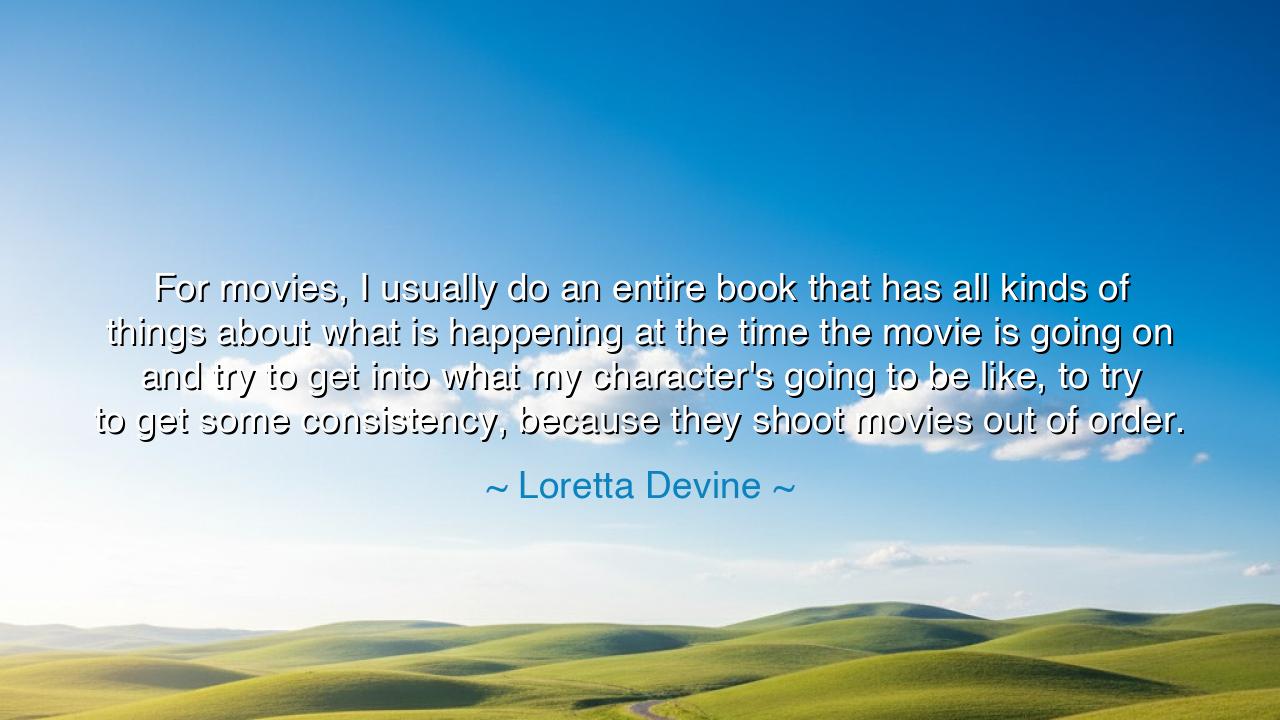
For movies, I usually do an entire book that has all kinds of
For movies, I usually do an entire book that has all kinds of things about what is happening at the time the movie is going on and try to get into what my character's going to be like, to try to get some consistency, because they shoot movies out of order.






Ah, the words of Loretta Devine, whose dedication to her craft speaks not only to the art of acting, but to the profound wisdom found in the very process of becoming another. "For movies, I usually do an entire book that has all kinds of things about what is happening at the time the movie is going on and try to get into what my character's going to be like, to try to get some consistency, because they shoot movies out of order." In this statement, Devine reveals a deeper truth about artistic preparation—the need for consistency in a character’s journey, even when the narrative is not told in a linear fashion. Like the ancient bards who would memorize their stories and perform them with great care, Devine understands the importance of building a foundation for her character, a world in which they can live, breathe, and evolve, even in a world of disjointed timelines.
In the ancient world, actors and storytellers were often tasked with creating characters that resonated not just in the moment of performance, but across the entirety of a play or epic. Sophocles, in his tragedies, crafted characters who were complex, whose emotions and choices were consistent, regardless of the specific scene in which they appeared. Each act, whether performed in a single sitting or spread over days, required the actors to embody a consistent emotional journey, one that spoke to the truth of the character’s essence. Just as Devine prepares her role by immersing herself in the context of the character, so too did the ancient actors strive to understand the motivations and arc of their roles in order to portray them faithfully, even as the play or story might unfold in stages.
What is most profound in Devine’s approach is her understanding that acting is not simply about memorizing lines, but about creating a living, breathing entity—a character that exists beyond the boundaries of individual scenes. This is a lesson that ancient artists understood well. Take Homer, for instance, whose characters in the Iliad and the Odyssey live and breathe across the vast landscapes of war and journey. The story does not unfold in perfect order, and yet each character, from Achilles to Odysseus, remains consistent in their virtues and flaws. Homer’s characters are not bound by the linearity of time, but by the constancy of their inner nature. Devine’s process, too, reflects this deep understanding—no matter how a film is shot, the character must remain consistent to their own truth, even when the scenes are not filmed in order.
The art of preparation, as Devine describes it, is one of deep introspection and understanding. The ancient philosophers—Aristotle, for example—believed that the pursuit of knowledge was a process of understanding the whole by exploring its parts. Just as a sculptor must first envision the completed statue within the marble before beginning to chip away at it, so too must an actor see the entirety of their character before the scenes are even shot. Devine’s creation of a book about her character is a modern equivalent of the philosopher’s notes, a way to internalize the whole journey of the character, understanding not just the specific scenes, but the emotional and psychological continuity of the role.
In this sense, Devine’s method mirrors the great warriors of ancient myth who understood that victory was not just about the battle at hand, but the entirety of their struggle. Achilles, in the Iliad, faces both the external battle and the internal conflict that shapes his destiny. His anger and his sorrow are not bound to specific moments but flow continuously throughout the epic. An actor like Devine, who invests herself deeply in the psychological continuity of her character, does the same: she allows the emotional journey of her character to transcend the individual scenes and become a holistic experience. It is this approach that makes her performances feel real, even when the film is shot out of order.
The lesson we can glean from Devine’s process is one of holistic understanding—in whatever craft we pursue, whether it be acting, writing, or leadership, we must first see the whole picture. We must understand not just the immediate tasks before us, but how those tasks fit into the larger narrative of our lives and our work. In this way, we can create with a sense of consistency and purpose, ensuring that each action we take is aligned with our greater goals. Just as Devine creates a roadmap for her character’s emotional journey, we too must chart our own course, understanding how each decision and each step contributes to the overall vision.
And so, the call to action is clear: prepare deeply for the journey ahead, whether it is the role you are about to play, the project you are about to undertake, or the life you are building. Understand the emotional truths that lie beneath the surface and keep those truths at the core of your work. Let every action, every decision, be consistent with the larger story of who you are and what you aim to achieve. Like Devine, who takes the time to create a detailed plan for her character, we too must approach our lives with a sense of clarity and vision, knowing that each small moment contributes to the greater whole of our journey.






AAdministratorAdministrator
Welcome, honored guests. Please leave a comment, we will respond soon